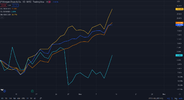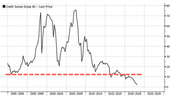- Joined
- 6 September 2016
- Posts
- 1,260
- Reactions
- 1,597
All an inevitable occurance. They learnt nothing from GFC and as I and others said at the time, they simply delayed the inevitable and a bigger problem.
Buckle up, boyos.
I will take the under.
Banking and investment banking is very different now from the GFC, many lessons in fact have been learned.
I think forward returns on ex-AU investment banks (where valuations are already rich) will be above benchmark and they have strong tailwinds with both rising rates and volatile rates.
I think investment banks are oversold on GFC fears from people who don't understand anything and could offer strong upside surprise.
I do not believe either CS or DB will fail.
Not bad...






